Three Chinese warships arrived in Cambodia on Wednesday on a visit aimed at strengthening already close ties between the two nations. As early as 2016, Cambodia hosted its first major naval joint exercises with Chinese forces. This round, as many as 700 crew members docked at the port of Sihanoukville, also known as “Kampong Som”.
Although the Chinese People’s Liberation Army Navy warships will not hold any joint military drill, they will spend four days (Jan 9 to Jan 12) at the Sihanoukville Autonomous Port. However, the visit coincides with the celebration of the opening of a new Cambodian naval outpost on the nearby Koh Rong Island. That speaks volumes about the close relationship between both countries.
The warships, belonging to the Chinese PLA Navy’s Northern Theatre Command, include the Wuhu and Handan, a pair of 4,050 tonne Type 054A guided missile frigates measuring 135m long and 16m wide, as well as the Dongpinghu, a hulking 20,500 tonne resupply vessel measuring 179m long and 255m wide.
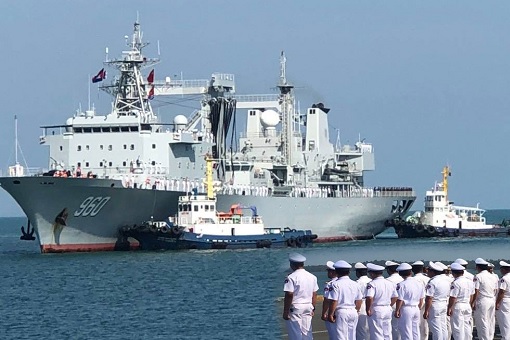
Interestingly, China has invested truckloads of money – billions of dollars – into Cambodia’s economy, including the Sihanoukville Port – a strategic deep water port situated about 185 km southwest of the capital of Phnom Penh. In June last year, Beijing promised US$100 million to modernise Cambodia’s military.
Despite Prime Minister Hun Sen’s 33-year authoritarian rule, China has been pampering the poor Southeast Asian kingdom with billions of dollars in soft loans, infrastructure and investment – including casinos and dams. Chinese hot money has transformed the once-sleepy backpacker destination of Sihanoukville into a gambling resort hub with 30 casinos, and 70 more under construction.
Yes, in 2017 alone, 120,000 Chinese visitors came to the city of Sihanoukville that only has 90,000 people in its urban centre – four times as many as the previous year. However, they flock there to gamble, not for the sun and surf and beautiful beach, let alone the Cambodian colourful culture. The city has become the Little Macau.
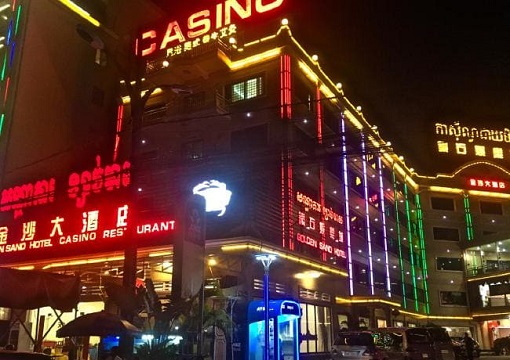
But social problems associated with gambling such as drugs, prostitutions and mafia were not the major concerns of the Western superpowers who watched how the Chinese slowly taking over the city. They were concerned about the Chinese military influence, so much so that Premier Hun Sen had to announce last November that Cambodia will not allow foreign military bases on its soil.
United States’ concerns about a possible Chinese naval site near hotly contested South China Sea was raised as rumours of a Chinese naval base is under construction off Cambodia’s southwest coast spread like wildfire. Hun Sen assured the U.S. – “The Constitution of Cambodia bans the presence of foreign troops or military bases in its territory…. whether naval forces, infantry forces or air forces.”
China has reportedly lobbied Cambodia – quietly – since 2017 for a base in the southwestern province of Koh Kong in the Gulf of Thailand, which would provide an important access to the South China Sea. Cambodia laughed off the report of the possible existence of a Chinese naval base, calling it a “psychological warfare” and the U.S. can check with their own powerful satellites.
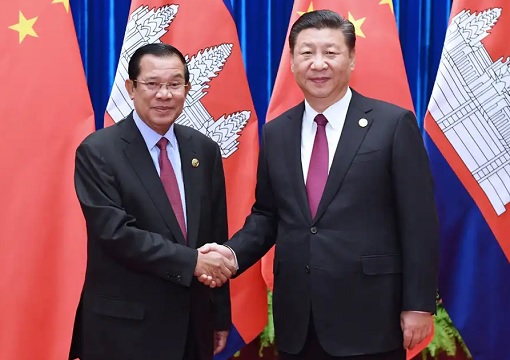
Hun Sen said the concerns over a Chinese naval base came from U.S. suspicion over Chinese investments in the Kingdom as the U.S. itself used similar measures in such programmes as the Marshall Plan (officially the European Recovery Program) which aimed to rebuild the economies of Western European countries after World War II.
Last November, Asia Times raised eyebrows in its article – “Cambodia at the centre of a new cold war” – when it claimed a naval base was part of a US$3.8 billion tourism development named Dara Sakor Beachside Resort led by a Chinese company. It claimed the project reportedly includes a deep-water port, an international airport and manufacturing facilities.
Apparently, the suspicion and paranoia stemmed from the fact that the deepwater ports have enough depth to service Chinese PLA Navy vessels, like destroyers and frigates. However, it’s also true that ports around the world are competing with one another and trying to build deeper facilities to lure large cargo ships to their shores.
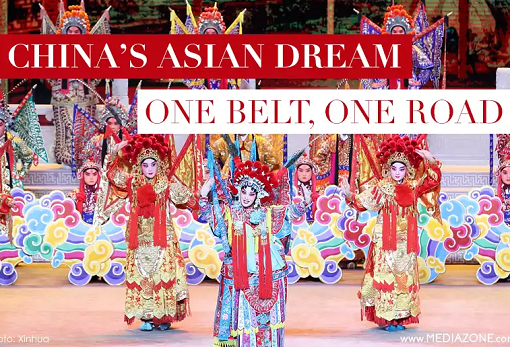
One of the objectives of President Xi Jinping’s Belt and Road Initiative (BRI) is to reduce the costs associated with exporting Chinese goods, hence the building of ports all over the world, including one in Israel. It is important to note that the U.S. objections to China’s alleged plans to construct a base along Cambodia’s gateway to the Gulf of Thailand comes as the Western power’s influence in Asia is beginning to wane.
Understandable also, the rumours of a Chinese military port came at a time when the relationship between Premier Hun Sen and the U.S. took a turn for the worse. Back in July 2018, the US House of Representatives passed the Cambodia Democracy Act of 2018, an act to promote free and fair elections, political freedom and human rights in Cambodia.
The Act, passed shortly before the Cambodia’s election on July 29, was designed obviously to target at Prime Minister Hun Sen. A year earlier, as President Donald Trump tried to improve the state budget, the U.S. renewed its demand for Cambodia to repay war debt of US$500 million, a debt the people of Cambodia call the “dirty and blood debt”.
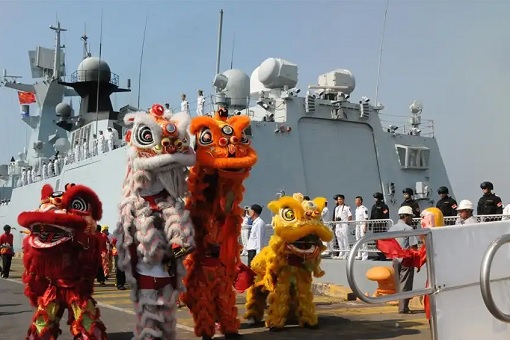
As suspicions grew that the U.S. sponsored opposition to overthrow Hun Sen, Beijing gladly backed the premier who was eventually re-elected in a landslide election victory. China is today the single largest investor in Cambodia. Heck, one Chinese company has even development rights over about 20% of Cambodia’s coastline.
Long before Hun Sen called China his country’s “most trustworthy friends”, the two countries’ relationship has been growing from strength to strength. In the 1970s, Beijing backed the deposed King Norodom Sihanouk against the US-backed Lon Nol regime. Even if there will be a secret plan between both countries for a Chinese military base in the future, can anyone blame Cambodia?
Other Articles That May Interest You …
- You Help Me, I Help You – 1MDB Bailout For Mega Deals Proves Crook Najib Had Sold His Country To China
- A Chinese $2 Billion Investment Is Ready To Take Over An Israel Port – And The U.S. Is Unhappy
- President Trump’s Trade War Strategy Against China Isn’t Working – It Gets Worse!!
- Trump Has 2 Ways To Stop China From Becoming A Global Leader In Technology
- Vanuatu Military Base – Australia Panic As China Secretly Militarizing Its Backyard
- Chinese Flag Raised At Sri Lanka Port Raises Concern Of China Secret Naval Base
- Forget South China Sea, China Is Dominating Indian Ocean – And India Isn’t Happy
- India Boycotts $100 Billion OBOR – Sees Through China’s Territorial Ambitions
- China Invasion – Top 10 American Iconic Brands Now Owned By Chinese

|
|
January 10th, 2019 by financetwitter
|


|

|

|

|

|

|




























Comments
Add your comment now.
Leave a Reply